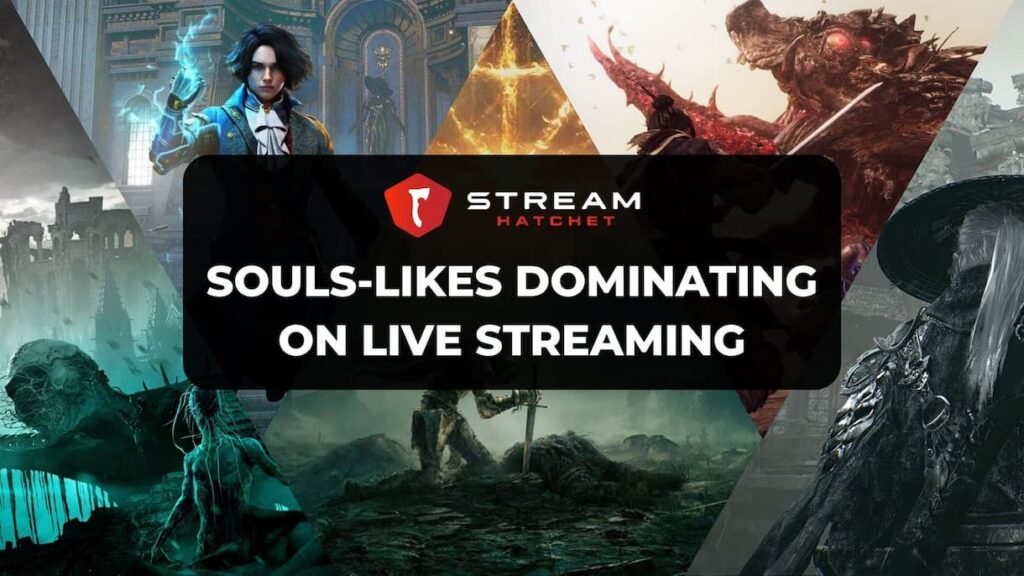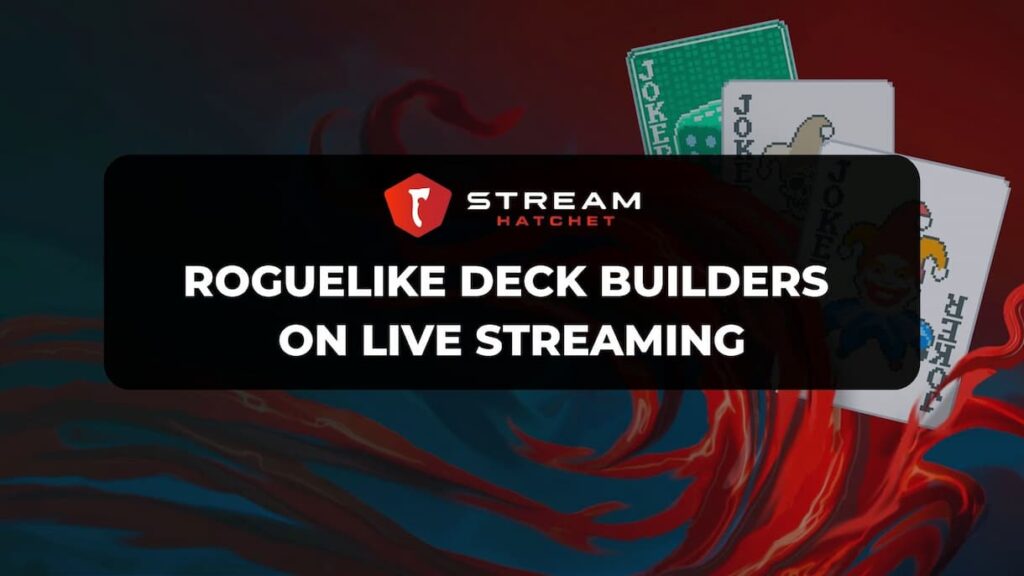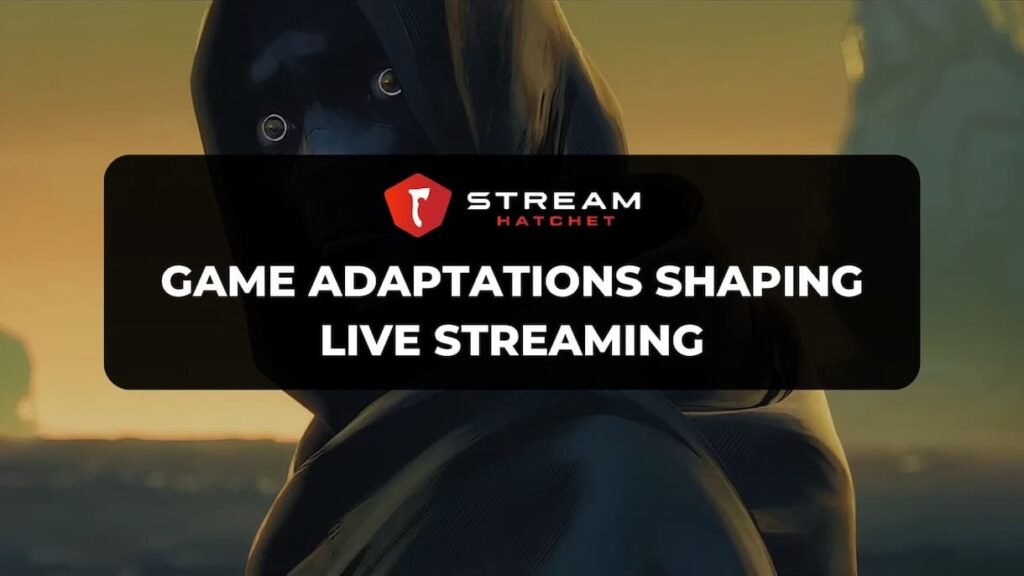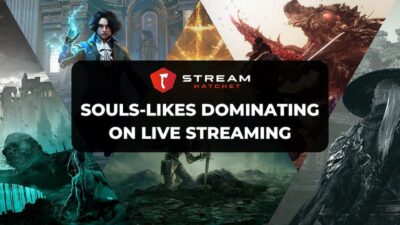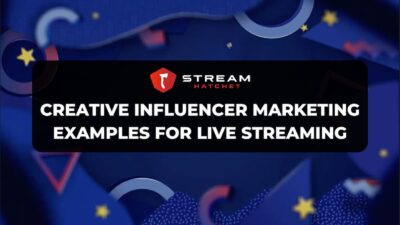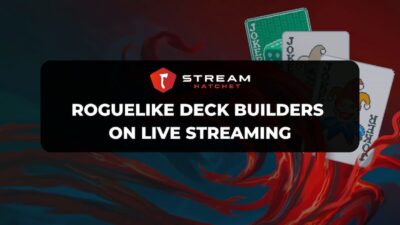A few keystone games are so influential that they shape the entire gaming landscape, spawning a wave of works inspired by (or straight-up copying) the original title. In the 2010’s, you’d be hard put to name a game more influential than FromSoftware’s Dark Souls: A hardcore action RPG with a grimdark aesthetic in which players lose their “souls” (experience points) upon death and must make it back to their body unscathed to prevent permanent experience loss.
These elements have become hallmarks of the so-called “Souls-like” subgenre, with AAA developers borrowing some or all of them to boost the popularity of their own games. In fact, March 2025 will see the release of two much-hyped Souls-like titles: The beautifully cel-shaded The First Berserker: Khazan from Nexon, and the post-apocalyptic sci-fi AI LIMIT from SenseGames. Publishers certainly seem to think the genre will lead to success – but how much do Souls-likes rely on support from live streaming to actually grab player attention?
In this article, we’re looking at how Souls-like games perform on live streaming, including how games use the Souls-like moniker to capture streamers’ attention.
Defining Souls-likes: Real genre, or Marketing Spin?
Before we jump into analyzing the success of the Souls-like genre, we’d do well to first examine how the term is used in modern gaming discourse. The term “Souls-like” has been bandied about so much by publishers and fans alike that, to some, it has practically lost all meaning. If you look at games tagged as Souls-like on Steam, you’ll find some games that are simply hardcore (like Path of Exile 2) and other games that are completely unrelated like Mahjong Soul and Pico Park. This needs to be borne in mind when looking at the number of “Souls-like” titles released on Steam per year according to SteamDB.
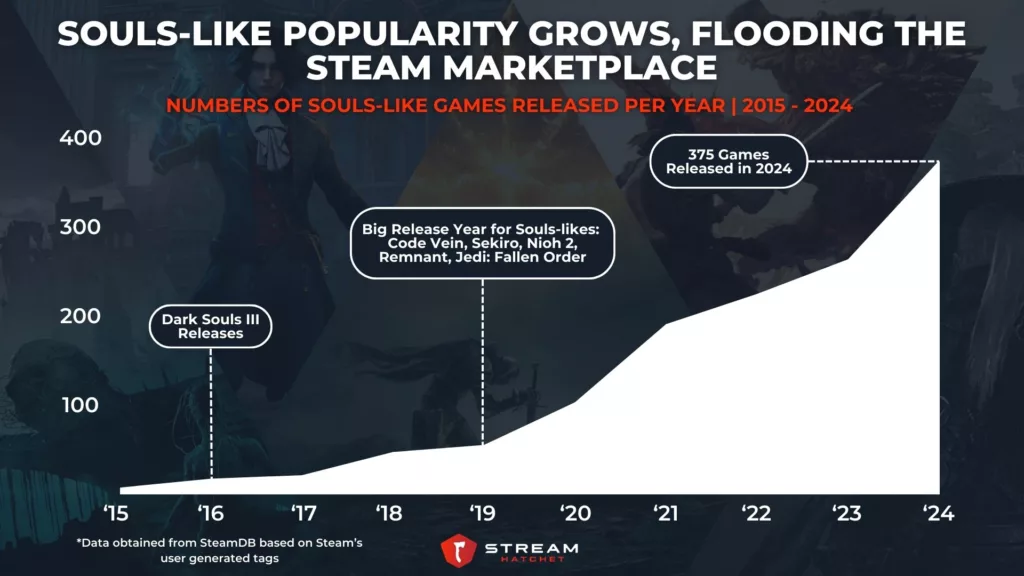
If we trust the Steam tagging system on the whole, then it appears as though 375 Souls-like games were released in 2024 – up from just 55 games in 2019. In fact, 29 Souls-like games have already been released in 2025 so far. But user tagging is highly misleading in this case, not just due to user error but also the difficulty of pinning down how many elements are needed to qualify a game for the label of “Souls-like”. Take Blasphemous for example: Ostensibly, the game should be considered a Metroidvania based on its map layout and overall progression. But the soul-collecting mechanic, grimdark world, worldbuilding discovered through item descriptions and steep difficulty curve have led many fans to label it a Metroidvania/Souls-like hybrid.
There are far too many examples to run through here, but one thing is clear: Whether more true Souls-likes are being released or not, it’s clear that publishers and fans are both aware of how enticing the label has become and are quick to slap it on games when possible. The popularity is so great that publishers are pre-emptively using titles with colons that imply future sequels, like the aforementioned The First Berserker: Khazan and Black Myth: Wukong. When labels become overused like this (see: open world, rogue-like etc.), it can be hard to discern the truth behind statistics relating to these terms.
With all of this in mind, we’ve used our own discretion on what constitutes a true or “Hard” Souls-like for the following analysis. Generally speaking, qualifying games will all include a soul-collecting mechanic, have high-difficulty ARPG gameplay, and have an emphasis on organic worldbuilding through environmental storytelling.
The Top Souls-likes Follow in FromSoftware’s Footsteps
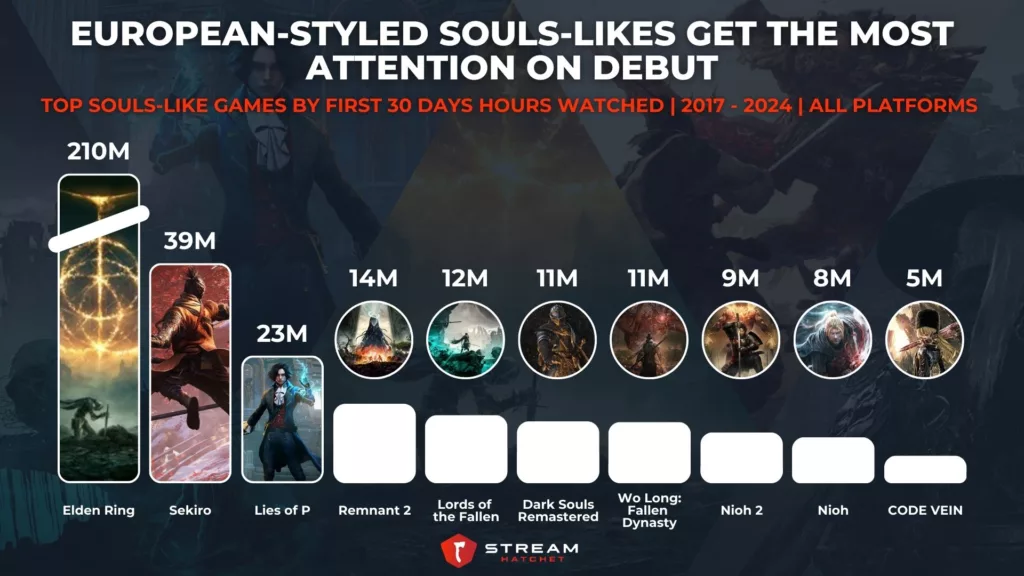
Looking at the top Souls-likes on live streaming by first 30 days hours watched, it’s not surprising to see FromSoftware’s own titles at the top: Elden Ring way out in front with 210M hours watched, and Sekiro: Shadows Die Twice in second place with 39M. As the developer that created the genre with Demon Souls back in 2009, FromSoftware’s games are considered the benchmark for Souls-likes and always generate hype upon release. The other games among the top 10 are all set in some form of medieval world, with European settings rising to the top like Lies of P (23M) and Remnant 2 (14M). However, popular favor may swing to Asian settings with the success of games like Black Myth: Wukong (discussed below) and upcoming titles like Wuchang: Fallen Feathers.
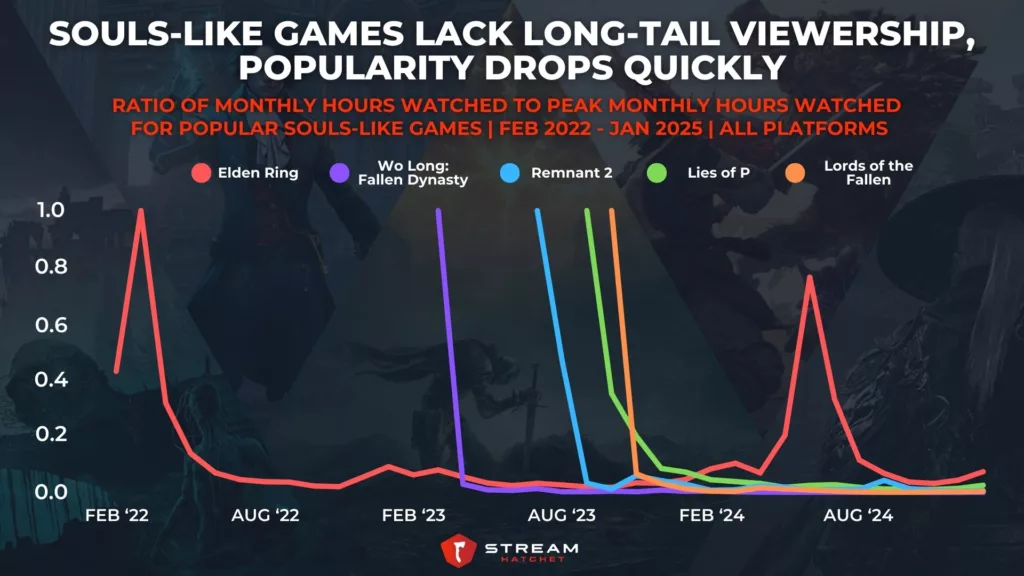
While these debut performances are impressive, publishers and brands alike should be aware of the nature of these games’ popularity on live streaming. In almost every case, even the most popular Souls-like titles see their viewerships drop dramatically after the first month of release. Wo Long: Fallen Dynasty and Remnant 2, for example, both fell to just 3% of their debut monthly watch time in their second month, before settling to between 1-2% every month thereafter. Keep in mind the first month is incomplete with these games rarely releasing early in the month. This means that, really, games are losing their viewership after just 1 or 2 weeks in most cases.
There was one obvious exception to this trend: Elden Ring. The game not only had an extraordinarily positive debut, but the release of the Shadow of the Erdtree DLC in 2024 gave it a second life. Even in the interim period however, Elden Ring managed to maintain 2-10% of its debut viewership. Of course the prestige of FromSoftware’s name helped, but the game’s large open world helped by allowing for longer runs while streamers like Kai Cenat propped up the game with challenge runs and marathon streams. Lies of P also fared slightly better than other Souls-likes examined, still hitting 35% the month after release and having a longer shoulder thereafter (no doubt helped by critical praise).
Games Trading on the “Souls-like” Label to Boost Viewership
As discussed earlier, some games seem like conventional Souls-likes, but either only feature a couple of Souls-like elements or blend Souls-like elements with other genres. Regardless, these games trade on the Souls-like label to grab attention, which makes them worth examining from a marketing perspective. We’ll call these games “Soft” Souls-likes to distinguish them from “Hard” Souls-likes like Elden Ring and Nioh.
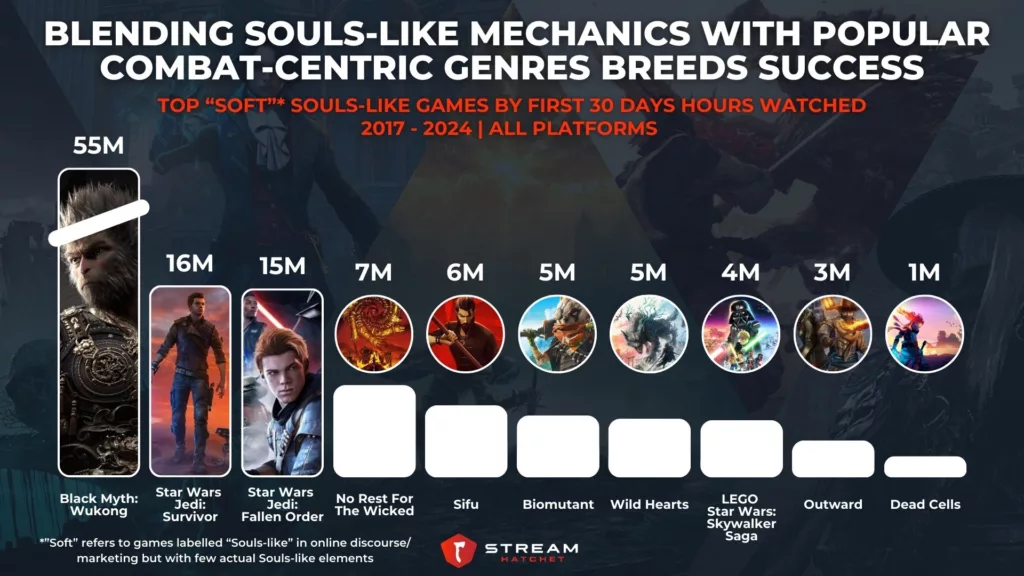
Among Soft Souls-likes, Black Myth: Wukong sits way out in front with 55M hours watched in its first 30 days. Although publisher Game Science repeatedly resisted the “Souls-like” label being applied to its game, Black Myth: Wukong was often given this association based on the game’s in-depth combat, high difficulty, emphasis on complex boss fights, and general aesthetic. In fact, the few negative reviews for the game often came from players who expected a more traditional Souls-like experience, demonstrating the potentially damaging effect of lax genre labelling. Taken to its extreme, any ARPG with intricate combat could quickly be subsumed (inaccurately) under the label of Souls-like, from God of War to Ghost of Tsushima.
On the whole, the top Soft Souls-like games brought in roughly half the watch time of Hard Souls-like games. The games that performed the best were either from big franchises (the two Star Wars Jedi games) or cleverly wove Souls-like mechanics into other popular genres (like No Rest For The Wicked blending Souls-like and ARPG gameplay). These genre-blending experiments are the most exciting prospects for publishers and brands, as they can potentially reach two different segments of the video game audience. They’re also fantastic for sparking discussion online, like the beginner-friendly Souls-like Another Crab’s Treasure or experiments in popular indie genres like rogue-like deck builders with the upcoming Death Howl.
Across both Hard and Soft varieties, the Souls-like moniker has boosted the popularity of the games discussed. Although the genre may be becoming saturated (thanks to the label’s loose application diluting its meaning), there are still a number of Hard Souls-likes coming soon with well-deserved hype around them. The First Berserker: Kahazan and AI LIMIT are set to release on the 27th of March, and S-Game’s Phantom Blade Zero is a highly anticipated Souls-like expected in 2026. As long as publishers are creating fantastic combat gameplay under the Souls-like label, players and viewers alike will continue to flock to these games upon release.
To keep up to date with the latest popular game genre trends on live streaming, follow Stream Hatchet:
